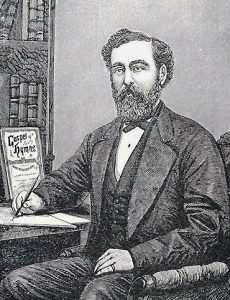


Philip P Bliss
Repertoire:
I Will Sing of My Redeemer
Almost Persuaded
Free from the Law
Hold the Fort
Hallelujah! What a Savior
It is Well with My Soul,
Jesus Loves Even Me
Let the Lower Lights Be Burning
Look and Live
The Light of the World is Jesus
Man of Sorrows What a Name
Once for All
Whosoever Will
Wonderful Words of Life
(1838 – 1876)
Philip P Bliss, a Pennsylvania farm boy, wrote some of the earliest and some of the greatest gospel songs that gained popularity in both America and Britain. Bliss had minimal schooling and little formal music training, yet in the short span of 1864 to 1876, he wrote the words and music for many songs that still stir our heart. Those include: Almost Persuaded, Free From the Law, Hold the Fort, Hallelujah! What a Savior, It Is Well with My Soul, Jesus Loves Even Me, Let the Lower Lights Be Burning, Look and Live, The Light of the World is Jesus, Man of Sorrows What a Name, Once for All, Whosoever Will. An interesting anecdote about his song, Wonderful Words of Life: “I carried that song through two seasons of evangelistic work, never thinking it possessed much merit, or that it had the element of special usefulness, particularly for solo purposes. It occurred to me to try it one day during the campaign in New Haven, CT, and, with the help of Mrs. Stebbins, we sang it as a duet. To our surprise the song was received with the greatest enthusiasm and from that time on to the close of the meetings was the favorite of all the hymns used.” [Bliss]
Bliss was born in a log cabin in Clearfield County, located in Northeast Pennsylvania, July 9, 1838. His parents were “hard-scrabble” farmers and practicing Methodists who loved to sing. That is where he first remembered singing and making music. Their daily activity included family worship which included Bible reading, prayer, and praise. As was fairly common for the time, Bliss left home early in his life to find work. Through his teens into his early 20’s, he worked at various lumber camps and sawmills while attending school as he could. Apparently, his early training at home was profitable for it was at the age of 12 that he made a profession of faith in Christ. He was baptized in a creek near his home at Elk Run and joined Cherry Flats Baptist Church of Tioga County, Pennsylvania. This church still meets today.
Despite little schooling, he was enlisted to teach school in Hartsville, New York, at age 18. This was an early tribute to his character and seriousness of purpose. The following winter of 1857 Bliss attended his first music convention in Rome, Pennsylvania, which furthered his deep love for music and strengthened his natural talent. There, he met J.G. Towner, who was the father of hymn writer D. B. Towner, the composer.
The winter of 1858 found 20-year old Bliss teaching school in Almond, New York. There he fell in love with Lucy J. Young, and they were married June 1, 1859.
Bliss had a dream to attend the Normal Academy of Music in New York, but he lacked the means. He later told the story of how he received the needed funds. His Grandma Allen told him she had been dropping coins into an old sock through the years. Upon counting the coins, she found more than the required $30. She gave this to Bliss and he completed the six-week course. There he met the music leaders of the area, was able to have his questions answered, and to see and hear many new songs and music unveiled. After Bliss completed the course, his father-in-law furthered his dream and bought him a $20 melodeon, a small, reed pump organ. With the melodeon and his horse, his new career was started. Income from teaching music allowed him freedom to attend other traveling music schools in 1861 and in 1863.
In 1869 a meeting with Dwight L. Moody changed his life forever. This came as the result of Moody hearing Bliss sing in the congregation during the meetings Moody was holding at the Wood’s Museum Theatre at Clark and Randolph Streets in Chicago. Moody invited Bliss to sing at the theater meetings and he never ceased urging Bliss to full-time service of the Lord. From Scotland, Moody sent letters: “You have not faith. If you haven’t faith of your own on this matter, start out on my faith. Launch out into the deep.” Lucy Bliss replied: “I am willing that Mr. Bliss should do anything that we can be sure is the Lord’s will, and I can trust the Lord to provide for us, but I don’t want him to take such a step simply on Mr. Moody’s will.”
Bliss did accompany Moody’s friend, Major Daniel W. Whittle to a Sunday School Convention at Rockford, Illinois, in 1870. It was there that he composed Hold the Fort, For I Am Coming. The song was based upon Whittle’s sermon illustration of an event during the Civil War Atlanta Campaign. Moody’s campaign was successful as both Whittle and Bliss eventually became engaged with Moody and his campaigns. The Blisses worked together providing music for the meetings with Whittle through the latter half of 1874 and 1875. They spent their last year, 1876, with Moody and Whittle in meetings scattered around the Upper Mid-West and the Northeast. They had also started discussing a Great Britain campaign with Moody and Sankey.
Philip and Lucy returned to Rome, PA, to be with their family for Christmas. They had agreed to be in Chicago for the 1876 New Year’s Eve service at Moody’s Tabernacle and they were going to leave their children with the family. Philip made a note that they had spent “the happiest Christmas he had ever known” with his mother, sister, and in-laws. They checked their luggage through to Chicago and boarded the train at Waverly, New York.
The trip started in a heavy snow storm and one of the engines broke down shortly after the start. They spent the night in a hotel before continuing their journey in the snowstorm. The progress was slow but uneventful as both Blisses kept busy with their plans. Survivors reported that as the train crossed a trestle not far from the station in Ashtabula, Ohio, they heard a terrible cracking sound. The trestle had broken and the train plunged into the water below. The wooden cars began burning from the kerosene heating stoves being used. The lead engine made it across with the second engine, two express cars, and part of the baggage car resting with their weight on the bridge. There were 159 passengers on the train; 92 were killed or died later of injuries and 67 survived. It was the worst railroad tragedy to that point in American history. Bliss was one of those thrown free but he was seen crawling back through a broken window to find his wife. Nothing of Philip or Lucy Bliss was ever found. The Blisses were survived by their two sons, George, age four, and Philip Paul, age one. A monument to Bliss was later erected in Rome, Pennsylvania.
Even after his death, his ministry continued as his friends and associates completed some of his unfinished works. One such friend was James McGranahan, a fellow composer and hymn writer. He wrote music to words Bliss had written which were later found in one of the trunks sent on ahead. The completed song was one of the first songs recorded by Edison on his new invention:
My Redeemer
Sing, oh, sing of my Redeemer,
With His blood He purchased me,
On the cross He sealed my pardon,
Paid the debt, and made me free.
Amos R. Wells, A Treasury of Hymns
Henry S. Burrage, Baptist Hymn Writers and Their Hymns
- H. Hall, Biography of Gospel Song and Hymn Writers
